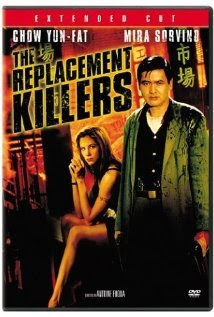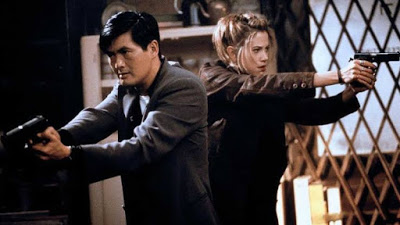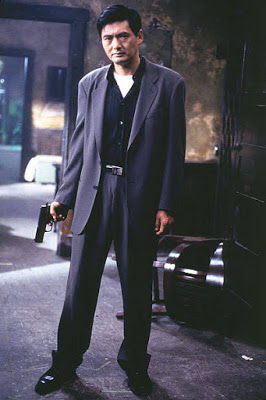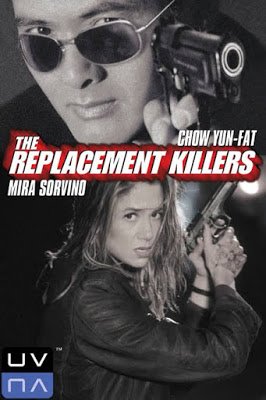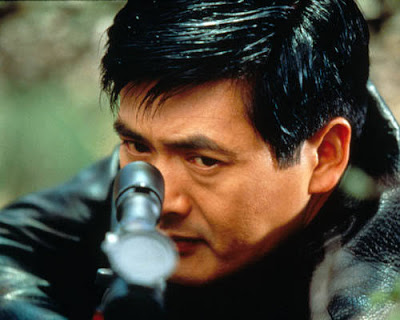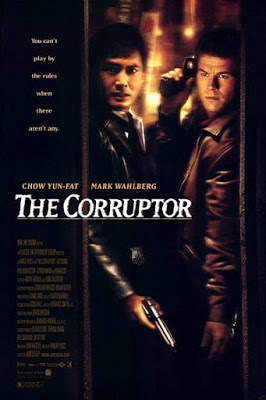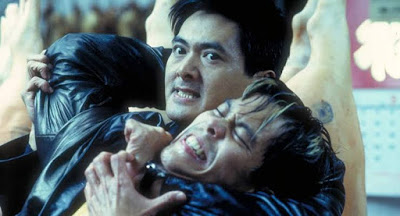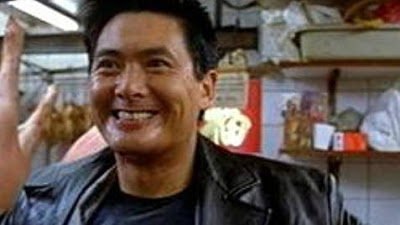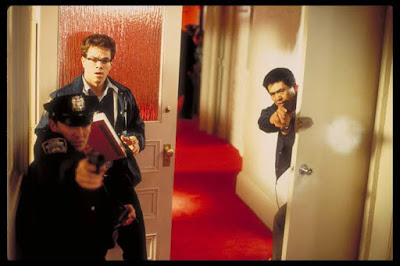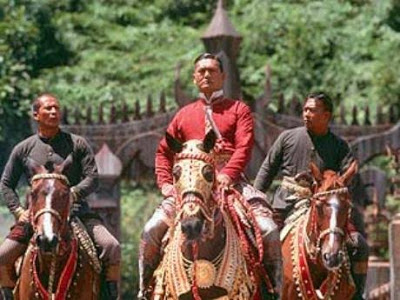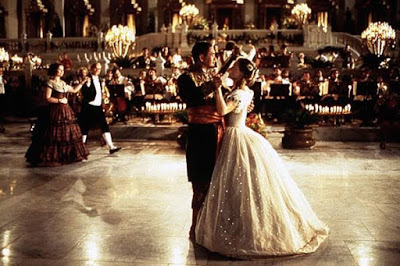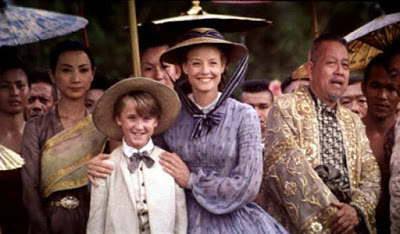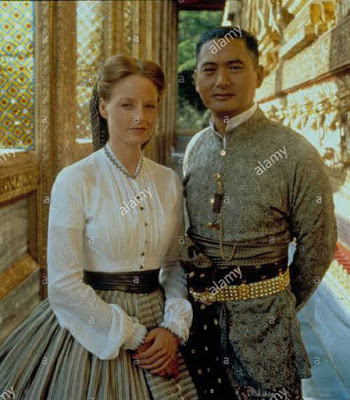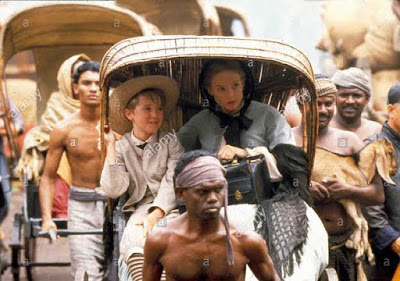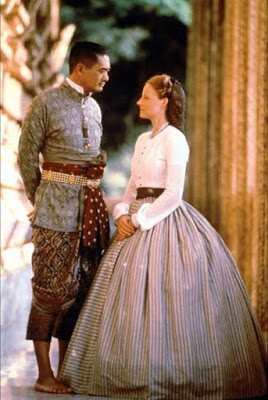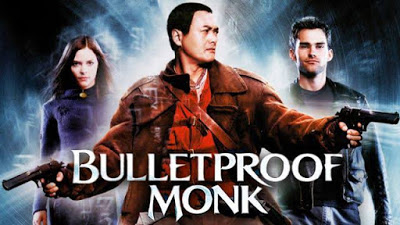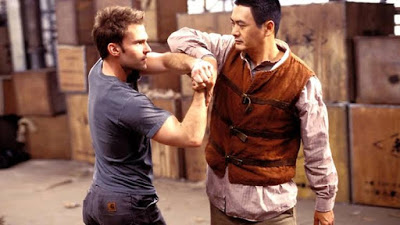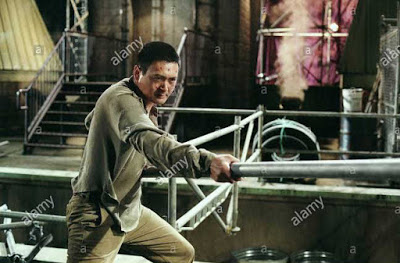Chow Yun-fat in America
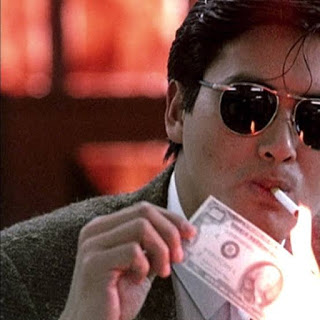
When
Chow Yun-fat decided to try his luck in Hollywood in 1998, it received a
lot of publicity from the Western media and a lot of groans from Hong Kong
film fans. It didn't work out very well in the end, a few ok but in the end
forgettable films. In truth, Hollywood didn't know what to do with him. He
was both famous but Asian whose English was limited. Almost too famous. What
kind of roles made sense for him? They never were able to answer that. In
Hong Kong he had not only been a big action star but a romantic lead as well
- but in his Hollywood films they keep him well away from any romantic or
sexual entanglements with white women. He made four strictly Hollywood films
between 1998 and 2003, but also the wonderful Crouching Tiger, Hidden Dragon
which had Western financing but was all Asian in every other way. So I am
not including that here. Now after Chow returned to Hong Kong in 2006 for
his first real Chinese film since Peace Hotel in 1995, he still popped back
to the USA at times to make a quick cash grab with appearances in a few films
in which he was not the lead. These are a Pirates of the Caribbean film in
2007, The Children of Huang Shi in 2008, Dragon Ball Evolution in 2009 and
Shanghai in 2010. I have not seen any of them and don't intend to. In Hollywood's
eyes he was now a supporting actor. I am always happy to see Chow pick up
some easy money - he is not a young man anymore (born in 1955) and has announced
that he will give away his fortune of over US$700 million dollars to charity
when he dies. So these movies in the end will be for a good cause! Here are
four reviews.
The Replacement Killers (1998) - 6.5
Director: Antoine Fuqua
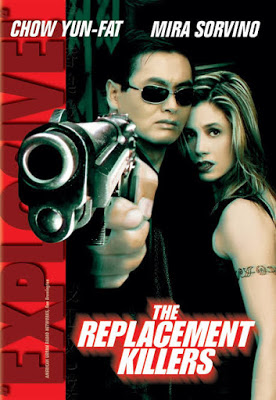
When this Hollywood production was released in 1998 it was met by a huge
backlash from Hong Kong film fans - of which I was one - though in truth
I don't really recall what my reaction was - probably joining in with the
chorus of naysayers in fear of being beaten by a tire iron (HK film fans
are tough!). On second look and far removed from the Chow Yun-Fat myth, this
actually is pretty decent for a shoot em-up action film. To understand this
negative reaction, one has to understand just how big Chow Yun-Fat was in
Hong Kong at the time. They called him the God of Actors. No one was more
popular at the time. And when he left HK to make this film, it felt like
he was deserting a sinking ship with the Handover taking place in 1997. A
few HK actors and directors did this if they could - it was hedging a bet
- if the Mainland came in hard and heavy they had a place to go. When that
didn't happen (until recently perhaps), many of them returned to the industry
in Hong Kong. But Chow Yun Fat was unique. He made HK seem super cool to
Western HK film fans in his tailored suits, sunglasses, leisurely stroll
with gun ready to be fired. He took up great space. When he is in the frame,
you don't really notice anything else.
At the time this took place Chow was as hot as a burning ember. It wasn't
always that way. He had been around for years in television and film dramas
and comedies and was popular but not explosive. Then in 1986 a nearly washed
up director (John Woo) cast a former Shaw Brothers star whose best days were
considered to be behind him (Ti Lung), an actor better known for his singing
career (Leslie Cheung) and Chow Yun-Fat. It was a remake of a 1960's film
and no one had great expectations for it. A Better Tomorrow was of course
a huge hit, created bullet ballet, made a success of Woo, resuscitated Ti
Lung's career, got Leslie started on his way towards being a film star -
and of course began the legend of Chow Yun-Fat.
His collaboration with Woo over the next few years produced other classics
- A Better Tomorrow II, Once a Thief, Hard Boiled and The Killer - and made
Chow the biggest actor not only in HK but also made him into an international
star. Though in the West he was primarily known for his action films - not
only with Woo but also his work with Ringo Lam (City on Fire, Wild Search
and Full Contact) - but in HK he was equally popular for his comedies, dramas
and romances. Some of these would be: Fractured Follies, Diary of a Big Man,
Eighth Happiness, The Greatest Lover and of course the splendid romance An
Autumn's Tale. Pretty much everything he touched turned to gold.
And then he left. My guess is that in his few films in Hollywood he probably
earned more money than in all of his HK movies put together. But perhaps
Hollywood didn't quite work out as his roles were not what he wanted and
by the Bulletproof Monk in 2003 it seemed clear that there were not many
opportunities for him - no different than other Asian actors - here he was
not the God of Actors - though in his five films he did make the great Crouching
Tiger (if you want to include that as a Hollywood film) and they gave him
a big production non-action film with Anna and the King.
The Chow Yun-Fat style is stamped on this film within seconds as if to announce
this might be Hollywood but this is still the Chow Yun-Fat you love. He enters
a nightclub, moving gracefully through the crowd, goes up to a table and
places a bullet on the table. That is the starting signal for a big gunfight
that breaks out and leaves a path of dead bodies. Chow plays John Lee who
has obligations to a Chinese triad head (veteran HK actor Kenneth Tsang)
and to pay it off he has to assassinate a few people. The first two are easy,
the third is a kid and he can't do it. You don't disappoint a Triad head
and he sends a platoon of his killers to get him - they don't - so they bring
in two pros. In the meantime, Lee needs to get a passport to get out of the
country and he goes to tough ass girl Mira Sorvino in a great role to obtain
one. They are interrupted. By killers and are on the run in a city where
the cops seem to disappear until after the shooting stops. Good thinking
boys.
It is directed by Antoine Fuqua in his debut after directing a ton of music
videos. Seems like a bad idea but he has an eye for style and was clearly
well-steeped in the Woo/Chow mythology. A bunch of stolen moments which may
have bothered me back then but just look cool again to me now. There are
a few very solid action set pieces where bullets are flying and men are dying.
He has of course gone on to a good career with the two Equalizer films, Training
Day and Olympus Has Fallen - his films may not be smart but you know you
will be getting some good action. And Chow has been back in HK making films
since 2006 acting in many films and though perhaps he is no longer the God
of Actors there any more, he is still loved.
The Corruptor (1999) - 5.5
Director: James Foley
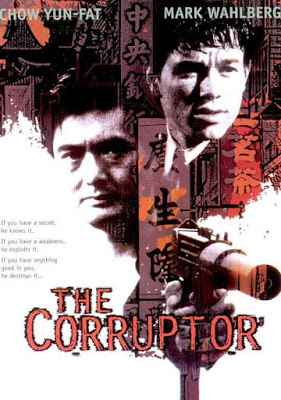
A year after Chow Yun-fat's appearance in Replacement Killers, he returns
in what looks to be a film project specifically tailored for him. A cop in
New York's Chinatown. It is darker, more complicated and seeped with more
moral ambiguities than was Replacement Killers. If Replacement Killers was
their attempt at John Woo's The Killer, this might be construed as their
attempt at Ringo Lam's Full Contact. Needless to say (though I am saying
it!), neither are in the same league as those two classics but are still
reasonably entertaining. These are the kind of films you would find in the
bargain bin at DVD stores if there were any these days. Enjoyable enough
but not keepers.
Chow Yun-Fat did not really speak much English unlike a lot of the elite
population in Hong Kong. He grew up poor, living on Lamma Island (off of
Hong Kong Island) where his home had no electricity and he worked in the
fields till he went to college. And then he jumped into acting and never
bothered learning any English - why bother he had Hong Kong. But once he
decided to try out for Hollywood, he tried learning quickly. In Replacement
Killers his discomfort with the language is fairly obvious and it limits
his performance to your basic glare and scowl method acting. Of course, he
was a killer and they probably do a lot of that. In The Corruptor his English
has improved considerably and so does his performance with him hitting a
lot of emotional notes quite well. I wish I could say the same for his co-star,
Mark Wahlberg.
Wahlberg has clearly grown as an actor since then, but at this time he had
Boogie Nights and The Big Hit (a film I need to watch again) in his pocket.
For this film he basically brings back Dirk Diggler as a cop and he is not
very good or believable. He seems to fade away on the screen as he brings
so little charisma to his performance. Just kind of Diggler like which was
good for an innocent porn star but not so much for this film.
To quote another film, forget it Jake, it's Chinatown. Where behind crumbling
tenement buildings, locked up basements, respectable store fronts business
is going on. Illegal business. Prostitution, gambling, narcotics, the sex
trade, human smuggling and plans for murder if need be. To be a cop in Chinatown
is to be an ant among a maze of interweaving passage ways and blind alleys.
To be a white cop in Chinatown is worse. Nick Chen (Chow Yun-Fat) is a tough
experienced cop who does his best to bring some justice and order to Chinatown
with brashness, bravado and the occasional shot to the head. You can't show
fear or indecision. You also can't be entirely honest. To know what is really
going on behind the curtain, you have to come to an arrangement with the
Triads. They help you sometimes, you look the other way other times. Money
and favors cross hands. He has it down to a science - understands the borders
not to cross but then a white hot shot cop is assigned to him who understands
nothing of this.
At this point the film devolves generally into that all too well tread genre
- the buddy cop movie where two cops have to work together and over time
they gain a grudging respect for one another. We have seen it all before
but placing it in the hyper violent murky Chinatown corrupt milieu and having
the dominant cop in the relationship be Chinese gives it a different spin.
It doesn't go quite where you expect it to either as the white cop is seemingly
lured into corruption by pretty made available Chinese women and a father
in debt while Chen also has a Chinese drug addicted prostitute that he indulges
in and makes a terrible judgement error when he thinks he can strike a morally
questionable deal with the Triads. Of course, Orientalism runs rampant here
- all the Chinese are depicted as thugs, killers, snitches, victims and prostitutes
- in this mysterious secret world that hides in plain sight. It isn't far
removed from the days of Fu Manchu but it is Chinatown, Jake. There are some
decent action scenes within - in particular a wild car chase in the streets
of NYC with guns blazing, machine guns taking out innocents and general havoc
and destruction. Quite well done though totally unbelievable that cops would
go wild west like that. Or so I hope since NYC is still my part time home.
Anna and the King (1999) - 6.0
Director: Andy Tennant
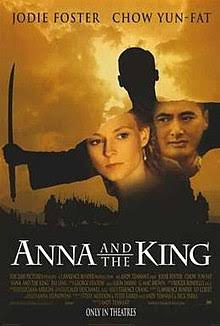
Hopefully I have not broken the law here in Thailand by watching this film.
Seriously. The 1956 version of this story starring Yul Brynner and Deborah
Kerr is in fact banned here and you can get in trouble for watching it. The
Thai's take their Royal family very seriously. A tip for you should you ever
visit the Land of Smiles - don't talk about the King. Not even a little bit.
If you go to a movie theater, stand up when they play the National Anthem,
not to do so will get you either thrown out or beat up - it has happened.
Don't get drunk and deface portraits of the King. Some nitwits did a few
years ago and they may still be in jail. A Thai jail is not a place you want
to be. For the most part there is total freedom of speech here, but the law
of lèse majesté is very much enforced.
I am not sure how this film was received here. It is in every way much more
respectful towards King Mongkut and Thai culture - in fact to the point where
he is portrayed nearly as a Philosopher King - but I notice it was mainly
shot in Malaysia; not in Thailand. Mongkut was in fact a great beloved King
who tried slowly to bring Thailand into modernity in many ways - science,
education, culture - who spoke English and French and had done an enormous
amount of reading. At the same time though he wanted to retain the power
of the family - The House of Chakri whose ancestor sits is on the throne
today - and keep Thailand safe and secure from foreign nations colonizing
everything around Thailand. He succeeded. His life was a fascinating one
- and the film alludes to it a few times. When his older brother died he
was the legitimate successor but was pushed out of the way by an older relative.
Instead of creating a civil war he retired to the Monkhood where he stayed
for 27 years until 1851. At that point he ascended the throne till he passed
away in 1868. He stayed busy - not only with affairs of state but by taking
on more consorts than any one man should need or be able - 32 of them who
produced 82 children! Nice job if you can get it.
One of the things he wanted was for his children to be educated and he brought
Anna Leonowens to the court to teach them English and science. She was a
remarkable woman in her own right. Born and raised into the British Raj though
at a low level in Bombay, she married, moved to Australia, her husband died,
she moved to Singapore where she took up teaching and that led to the invitation
to Siam. She stayed there for five years until she left to England for holiday
and while gone King Mongkut died and she never returned. Her son, who has
a prominent role in the film as a young boy, returned to Siam at the age
of 25 and joined the Thai calvary! Kind of cool. Of course, Leonowens became
famous when she published her memoir of her time in Siam in 1870. It made
her a media star and though it is thought by many that she greatly exaggerated
her influence on the King and his heir Chulalongkorn, much of it is within
the realm of possibility and once Chulalongkorn became King he corresponded
with her for years. He too was a reformer - ending slavery - and you will
see photos of him here all the time - the fellow with the big moustache -
very much loved. Later Anna moved to Canada and set up the Nova Scotia College
of Art and Design that is still around today. All of this in the mid-century
of the 19th century. By a female. Incredible. And the Great-Aunt of Boris
Karloff!
In theory these films are based on her memoir though with more than a little
literary license. In reality, there was not even a hint of romance between
the King and Anna and I am pretty sure they never waltzed together. This
is from another perspective a buddy film - a King with absolute power who
comes to respect and listen to this prim ungainly British woman. If you see
photos of the real Anna, you will understand why the odds of a romance are
zero - not Jody Foster or Deborah Kerr for sure. Her diary is on Kindle and
I read it last year. On many levels it is fascinating even if the writing
itself feels rather dry now. Her descriptions of the court, the rituals,
the culture, the surroundings was of great interest to me. She also described
the Thai people and here she had little good to say. She was to her core
a proper British lady and in those days that entailed looking down on every
culture. She also describes a trip to Angkor Wat that amazed me. I always
thought it was lost for a long time and she talks about it at length in her
diary.
The film is big and gorgeous - stunning settings, beautiful elaborate sets
that really look like the Grand Palace, ornamental costumes to dazzle, grandeur,
rituals - everything is done so well. But for me the film was a bit of a
slog at 142 minutes because at the end of the day she was just a teacher
at the court - Mrs. Chips Goes to Siam. The dramas they throw in are made
up - there is no Gunga Din moment, no forbidden romance by one of the King's
consorts, no coup attempt - only the drama of the King's tiny daughter is
true. Now she did in truth (according to her memoir) stick up for her rights
quite boldly but she did not interfere when a girl is caned. A lot of this
is for modern audiences that want her to be a hero. She is a hero but not
an action hero.
One has to wonder why this story has captured the imagination so much - first
the memoir way back when, then the musical on Broadway, the film version
of it, a few TV shows about it and this one in 1999. Is it just the exotica
of it? Or the clash of cultures? The near taboo romance between an Asian
man and a white lady? The white superiority attitudes that come through?
Or maybe it is just a simpler explanation of the great songs the Rogers-Hammerstein
score that made people feel great and have affection for this story. Not
sure, but also not sure the world needs another version of it any time soon.
Chow Yun-fat as the King is terrific I thought capturing both his authority,
his soft side for his children, his nobility, his attempt at the Thai language
and his magnetism when needed. Foster's cobalt blue eyes are like lasers
burning through you - no wonder people had trouble saying no! She is excellent
as well with a role that actually has very little leeway to play with - stiff
backbone, precise diction and show no emotion Britishness. One might question
why a Chinese man plays a Thai King - definitely a step up from Yul Brynner
but in today's environment that may not be PC. I am not sure. Hard to keep
up. Even odder was seeing HK actor Kenneth Tsang as a Thai judge. What the
hell. I am glad I finally watched this but in truth it took a few sittings.
The Bulletproof Monk (2003) - 3.0
Director: Paul
Hunter
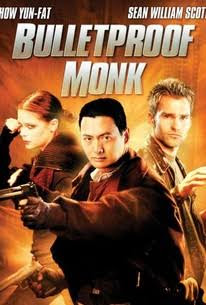
We should probably be grateful for this film. I think it drove Chow Yun-fat
back to where he belongs, Hong Kong. This is a shockingly bad film in every
way I think movies are judged by. It is perplexing - in 2000 Chow Yun-fat
had a worldwide hit with Crouching Tiger, Hidden Dragon - a universally loved
film and this is what Hollywood offered him next. Over three years later.
I am missing something obviously - whether Chow turned down even worse films
or needed a break - but offering him this film to co-star with frigging Seann
William Scott, who was best known for playing Stifler in American Pie I and
II is so insulting. Kind of like a fuck you from Hollywood. I hope Chow made
a bundle. After this he eased back into Chinese films with the Curse of the
Golden Flower in 2006 being a big hit.
I have no idea who director Paul Hunt is but looking at his resume he has
directed practically nothing but video shorts before and after Bulletproof
Monk. I guess they figured it worked out ok with Antoine Fuqua in Replacement
Killers, so why not. Paul Hunt is no Antoine Fuqua and Fuqua is basically
only good at constructing action scenes. Anyway, I was hoping to find out
that he was in prison for this, but no such luck.
Let me explain the pain here in. Incredibly original plot. We are in Tibet
in 1943 and there is a display on a narrow wooden bridge of some of the worst
wire-fu ever seen for the past 50 years or so. Chow is the Monk with No Name
who is about to be passed the responsibility for protecting this scroll.
That if read out loud can destroy the world. My first instinct was - so destroy
the scroll. Aren't these suppose to be wise monks. No one ever said, why
don't we just smash it. And who shows up at the door to obtain it - the Nazis
of course. Holy Indiana Jones! Chow escapes and we jump 60 years forward
(the scroll gives him powers) where he just seems to roam the streets of
NYC for no particular reason. That is when he isn't spouting in Charlie Chan
like Buddhist mumbo jumbo. The Nazi head who was at the temple is still alive
and after Chow with a bunch of mercenaries as they rampage through NYC. He
has a hot daughter though who likes killing people. A chip off the old block.
Then Stifler - I mean Kar shows up and gets involved. The only authentic
part was the scene inside the Chinese movie theater where all sorts of riff-raff
hang out. It brought me back to the Music Palace in NYC before it shut down
where you got a double feature for $6 and the place was full of people eating
Chinese food, sleeping, cats roaming after rats - it was great. My Chow Yun-fat
Hollywood penance is finished. I love the man and am glad that it didn't
work out in Tinseltown for him.



